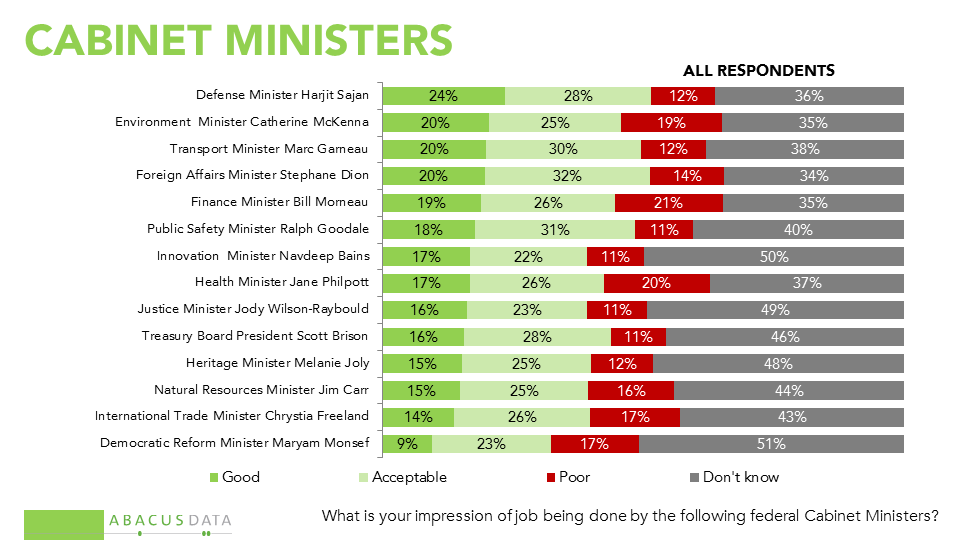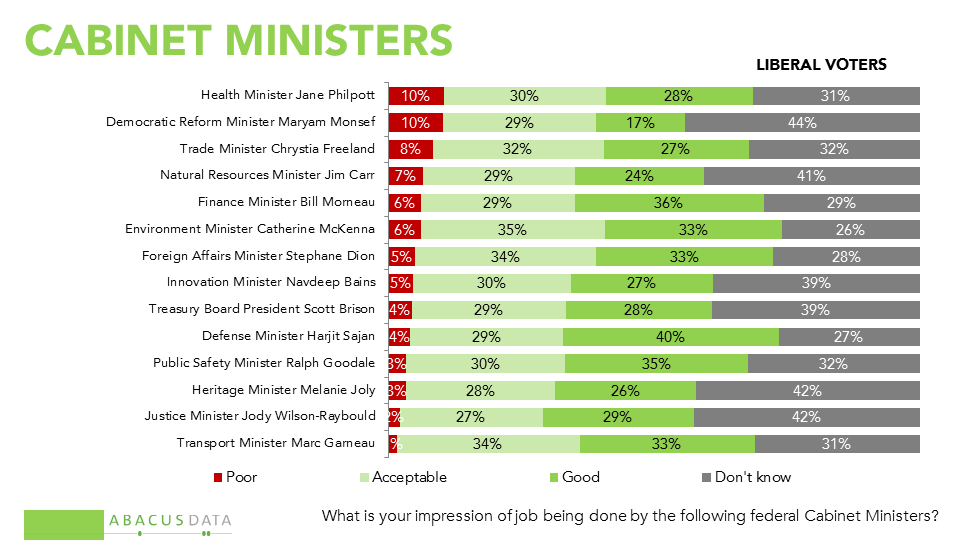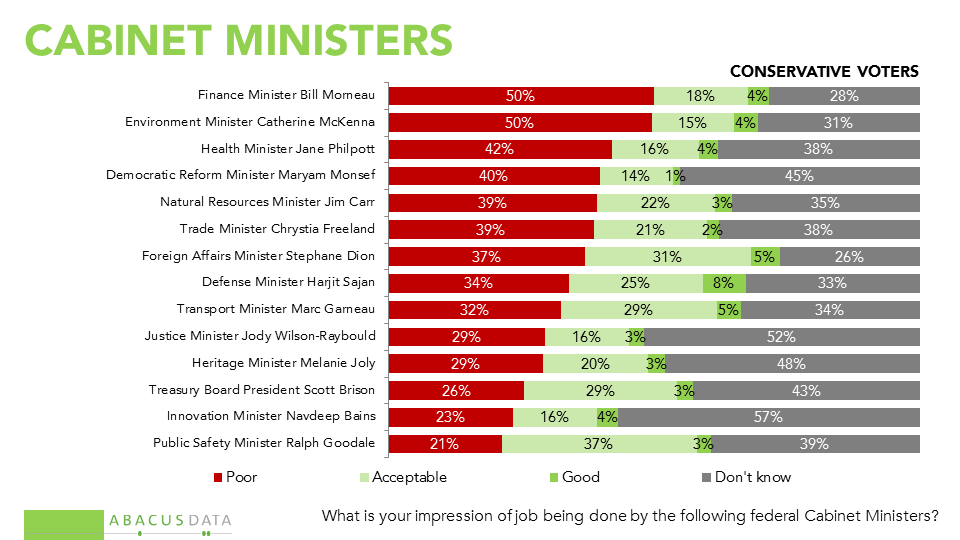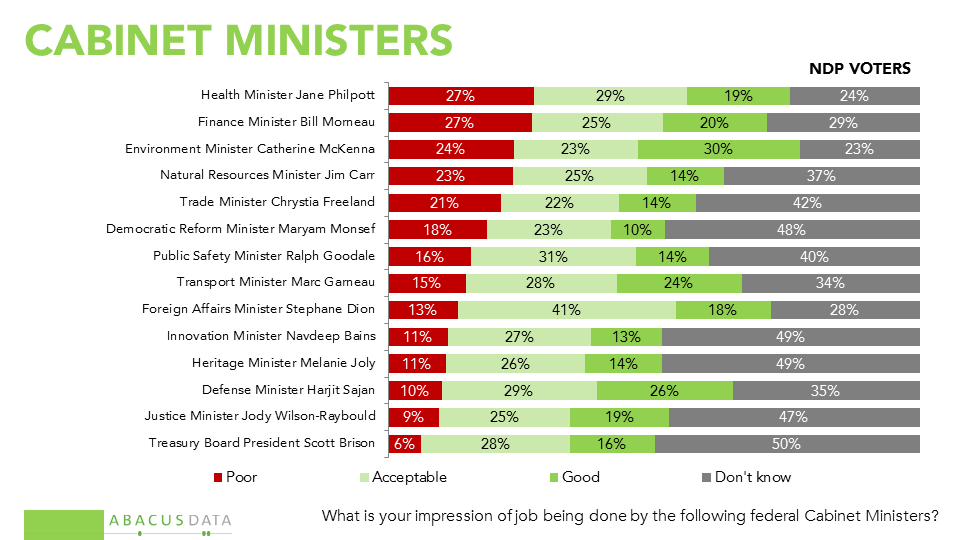Rating 14 Trudeau Ministers: None show high negatives
December 23, 2016
In our final survey of the year, we asked Canadians to give us their impressions of a wide range of people including 14 current federal Cabinet Ministers (we intend to gather impressions of other Ministers in an upcoming survey). Here are the highlights:
• As expected, many of the ministers are not household names for a significant proportion of voters. Between a third and a half of those surveyed were unable to offer an opinion about the job being done by the ministers tested.
• The amount of negative opinion about any of the ministers tested is quite limited, ranging from 11% to 21%. Given that most respondents didn’t vote Liberal, this suggests the Cabinet is generally not, at this point anyway, a focal point of partisan tension.
• Of the 14 tested, the ministers with the highest profile (fewest respondents unable to offer an opinion) included three rookies and two political veterans: Defense Minister Harjit Sajjan, Environment and Climate Change Minister Catherine McKenna, Health Minister Jane Philpott, Foreign Affairs Minister Stephane Dion, and Transport Minister Marc Garneau.
• For all ministers tested, more people offered good or acceptable ratings than offered negative assessments. The largest proportion of “good job” ratings went to Harjit Sajjan, Catherine McKenna, Marc Garneau, Stephane Dion, and Bill Morneau. The smallest positive ratings were for Maryam Monsef, who is also the least familiar to our sample.
• The ministers with the highest negatives were Bill Morneau, Jane Philpott, and Catherine McKenna. The ministers with the lowest negatives were Scott Brison, Navdeep Bains, Jody Wilson-Raybould, and Ralph Goodale.


• Few Liberal voters give poor assessments to any of the ministers. The performance of Ministers Sajan, Goodale, and Morneau are more likely to be rated positively. Only Ministers Philpott and Monsef get negative ratings in double digits.
• Among Conservative voters, Ministers Morneau and McKenna draw the largest number of negative assessments while Ministers Goodale, Bains, and Brison trigger few negative reactions.
• Among NDP voters, relatively few are unhappy with the Ministers tested. Ministers Philpott and Morneau draw the most criticism, disappointing 27% of NDP voters. Opinion about Minister McKenna is somewhat polarized – she tops the list in terms of positive ratings, but ranks third in terms of drawing criticism among NDP voters.



UPSHOT
According to Bruce Anderson:
“After just a year in office, it would be surprising if more of these ministers were better known, especially in an era when many people pay limited attention to national politics.
The results suggest that, consistent with the fact that the large majority give the PM good or acceptable marks for his cabinet selections (80%) most people are not finding much to fault in the performance of the cabinet.
Those handling some of the trickiest files (e.g. Finance, Health and Environment) are seeing slightly more polarized reactions, but this is, to this point anyway, a fairly mild version of polarization.
The fact that only half of Conservative voters give a bad rating to the Finance Minister illustrates this point.
As well, Resources Minister Jim Carr, who handled the pipeline file that could have sparked strong negative views on the left, finds only 23% of NDP voters giving him a negative rating.
The results for Democratic Reform Minister Monsef indicate some disappointment in her approach. But perhaps the more notable point is that while she has been the focus of a lot of Parliamentary and media criticism personally over the year (including about where she was born), half have not even been aware of Ms. Monsef so far.”
METHODOLOGY
Our survey was conducted online with 1,848 Canadians aged 18 and over from December 12 to 14, 2016. A random sample of panelists was invited to complete the survey from a large representative panel of over 500,000 Canadians.
The Marketing Research and Intelligence Association policy limits statements about margins of sampling error for most online surveys. The margin of error for a comparable probability-based random sample of 1,848 is +/- 2.3%, 19 times out of 20.
The data were weighted according to census data to ensure that the sample matched Canada’s population according to age, gender, educational attainment, and region. Totals may not add up to 100 due to rounding.
ABACUS DATA INC.
We offer global research capacity with a strong focus on customer service, attention to detail and value-added insight. Our team combines the experience of our Chairman Bruce Anderson, one of Canada’s leading research executives for two decades, with the energy, creativity and research expertise of CEO David Coletto, Ph.D.




